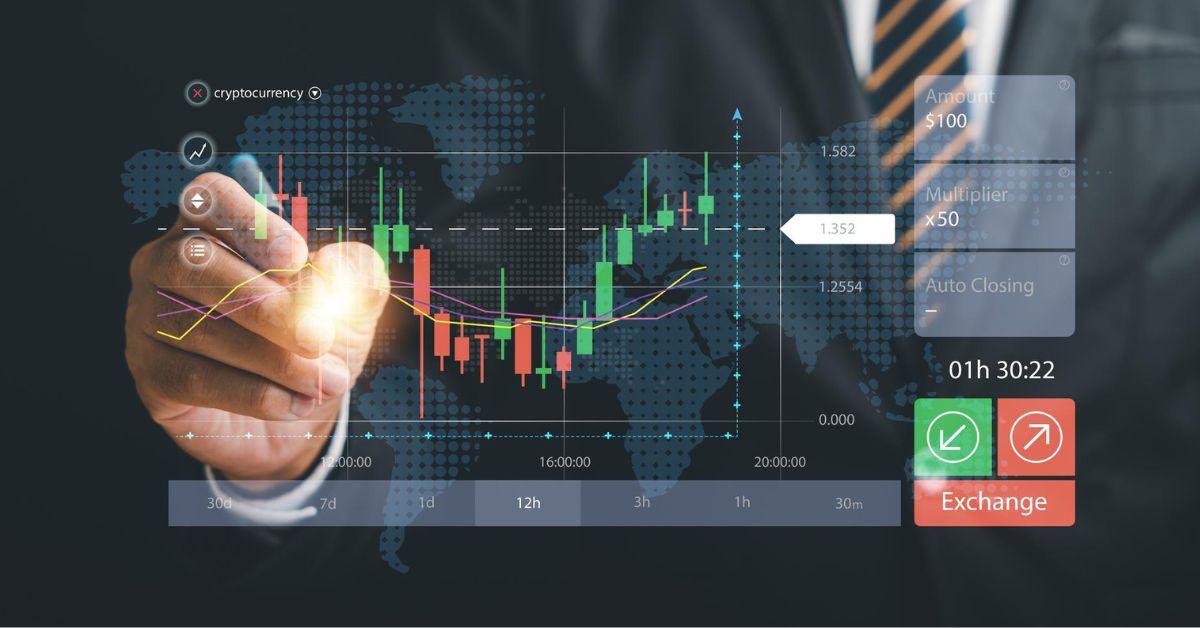In the world of trading, facing losses and missed opportunities is inevitable. Both new and experienced traders often feel “trading regret,” which can affect their decision-making and confidence. The ability to manage regret is crucial to long-term success, as it can prevent future mistakes.
In this article, we’ll explore why trading regret is common, the psychology behind it, and strategies to manage it. Trade platforms like Prime XBT offer invaluable resources and insights to help traders enhance their trading strategies.
Platforms with various features allow traders to minimize impulsive decisions and make informed choices. The Prime XBT system can be a valuable ally for traders aiming to refine their approach and reduce regret. So, join PrimeXBT today! Use promo code PRIMEOTT to receive a +7% bonus on your deposit.
What is Trading Regret?

Trading regret is the feeling of disappointment or frustration after a trade doesn’t go as planned. It’s common among traders who face frequent market ups and downs. This regret can stem from losses, missed opportunities, or poor timing in trade execution. It often leaves traders second-guessing their decisions and questioning their strategies.
Trading regret may lead to emotional trading, where decisions are driven by feelings rather than logic. A better understanding of trading regret helps traders recognize the impact of their emotions. This awareness can pave the way to more strategic trading decisions.
Why is Trading Regret Common in the Trading World?
Trading regret is a common experience due to the volatile and high-stakes nature of trading. The pressure of quick decision-making and emotional influences make it hard for traders to avoid regret.
High-Stakes Environment
The trading world operates in a high-stakes environment where money and emotions run high. This constant pressure to perform makes regret common among traders. Each trade has the potential for significant gains or losses, often amplifying emotions. When a trade doesn’t meet expectations, traders may feel they’ve “lost out.”
The pressure to succeed in a volatile market creates the perfect conditions for regret. This high-stakes environment often leaves traders second-guessing their decisions, further fueling trading regret.
Fast-Paced Decision-Making
Due to constantly shifting markets, trading often requires quick, real-time decisions. This fast-paced decision-making environment increases the chance of making mistakes, and traders may feel rushed and make impulsive choices.
Missed opportunities or losses can then lead to deep regret. Since traders have limited time to analyze each trade, they may overlook key factors. These quick decisions, driven by pressure, often leave traders questioning what they could have done differently.
Unpredictable Market Shifts
The unpredictable nature of the market is another reason for common trading regret. Markets can change in an instant, turning a profitable trade into a loss. Traders may feel they’ve made the wrong call when these shifts occur suddenly.
This unpredictability means that even well-planned trades can face unforeseen risks. When outcomes are not as expected, regret and frustration easily arise. This element of surprise in trading makes it hard for traders to avoid feelings of disappointment.
Social Comparison and “Fear of Missing Out”

Social media and trading communities often highlight others’ successes, amplifying regret. When traders see others’ profitable trades, they may feel they’ve missed similar opportunities. This “fear of missing out” can lead to feelings of inadequacy and regret.
Constant comparison with successful traders adds pressure to make risky decisions. Regret may also come from taking trades inspired by others’ wins without fully analyzing them. Social comparison creates a cycle of unrealistic expectations and regret in trading.
Emotional Influence (Fear and Greed)
Emotions like fear and greed play a powerful role in trading, often fueling regret. Fear may lead traders to exit trades too early, missing potential profits. Greed, on the other hand, can drive traders to hold positions longer than necessary.
When trades end in losses or missed gains, regret often follows. Emotions cloud judgment, making rational decisions difficult in high-stakes situations. The impact of fear and greed on trading can help traders minimize emotional regret.
Types of Trading Regret
Trading regret often takes different forms, each stemming from unique challenges within the trading environment. Recognizing these types can help traders identify and manage their emotions more effectively.
Missed Opportunities
Missed opportunities are a common form of trading regret. They often arise when traders hesitate to enter a trade that later becomes profitable. This hesitation may be due to uncertainty or waiting for a better entry point.
When prices rise without them, traders are left feeling they missed a valuable chance. This type of regret can lead to “chasing” trades or making impulsive decisions. Learning to accept missed opportunities can help reduce impulsive trading in the future.
Poor Trade Execution
Poor execution happens when traders make technical errors, like entering or exiting at the wrong time. Even minor mistakes, such as setting a buy or sell order incorrectly, can lead to significant regret.
These errors can feel especially frustrating because they often result from lapses in focus. Regret over poor execution may also cause traders to doubt their overall strategy. Working on technical skills and using a trading plan can help minimize this type of regret.
Exiting Too Early or Too Late

Timing is critical in trading, and exiting too early or too late can lead to regret. Traders who exit too early often miss out on additional profits, while those who exit too late may face unexpected losses.
The regret from timing errors is common, as no one can predict the market’s exact movement. This type of regret can encourage traders to be overly cautious or overly risky. Having clear exit strategies can help manage this timing-related regret.
Losses Due to Emotional Trading
Emotional trading, influenced by fear, greed, or impatience, often results in regret when trades go poorly. Traders may buy or sell based on emotions rather than strategy, leading to regretful outcomes. Acting on emotion rather than analysis can cloud judgment and create costly errors.
Regretting from emotional trading can make it harder to trust one’s trading plan. By focusing on logical decision-making and developing a disciplined approach, traders can avoid this type of regret.
The Psychological Impact of Regret on Traders
The psychological impact of regret on traders can be significant, affecting both their emotional well-being and trading performance. When regret builds up, it can lead to stress, self-doubt, and even anxiety, making it difficult for traders to approach the market with a clear mind.
This mental strain often impacts their ability to make sound, rational decisions, leading to impulsive actions driven by fear or frustration.
Regret can also create a negative feedback loop, where traders fixate on past mistakes and lose confidence in their strategies. This cycle of regret and hesitation can cause traders to second-guess themselves, miss opportunities, or avoid taking calculated risks.
Over time, this mental pattern may lead to burnout, lower motivation, and emotional fatigue. Recognizing the psychological impact of regret is essential for traders aiming to maintain a balanced, resilient mindset in the ever-volatile trading environment.
Strategies to Manage and Overcome Trading Regret
Managing and overcoming trading regret is essential for maintaining a healthy mindset. Here are eight effective strategies to help traders cope with regret.
Acknowledge and Accept Regret
The first step in managing trading regret is acknowledging its presence. Recognizing your feelings allows you to confront them rather than ignore them. Accepting that regret is a natural part of trading can help you move forward. Instead of dwelling on mistakes, focus on learning from them.
This mindset shift fosters resilience and encourages a growth-oriented approach. If you accept regret, you’ll be able to improve yourself and make better decisions in the future. This acknowledgment can also ease the emotional burden, making it easier to let go of past mistakes.
Analyze Your Trades
Take time to review your past trades, both good and bad. This analysis helps identify patterns in your decision-making process. Understanding what led to regretful trades can provide valuable insights for future actions. Look for common mistakes or emotional triggers that influenced your choices. Use this information to refine your trading strategies and enhance your skills.
Using past experiences as a learning tool can allow you to turn regret into an opportunity for growth. Analyzing trades can also boost your confidence, as it shows that you’re committed to continuous improvement.
Develop a Trading Plan

Creating a detailed trading plan is crucial for managing emotions and minimizing regret. A well-structured plan outlines your goals, risk tolerance, and strategies. It helps you remain disciplined and focused, reducing impulsive decisions. When you have clear guidelines, you’re less likely to act out of fear or greed.
A trading plan also provides a reference point for evaluating your trades. If you stick to your plan, you’ll feel more confident and make fewer regrettable decisions. Regularly revisiting and updating your plan ensures it remains relevant to your evolving trading style.
Set Realistic Expectations
Setting realistic expectations can help significantly reduce trading regret. Understand that losses and missed opportunities are part of the trading journey. Emphasizing long-term goals rather than short-term gains can shift your perspective. When you accept that not every trade will be profitable, you can approach the market with a clearer mindset.
Realistic expectations can also help you celebrate small victories, boosting motivation. By focusing on gradual progress, you’ll experience less disappointment and regret over time. This shift in mindset encourages patience, which is essential for successful trading.
Practice Mindfulness Techniques
Incorporating mindfulness techniques into your trading routine can help you manage emotions effectively. Mindfulness encourages awareness of your thoughts and feelings without judgment. This practice allows you to observe your trading emotions, reducing their impact on your decision-making.
Techniques such as deep breathing, meditation, or journaling can enhance self-awareness. Mindfulness can help you better regulate your reactions to regretful situations. This emotional control leads to more rational, informed trading decisions. Over time, mindfulness can help create a calmer, more focused trading environment free from unnecessary stress.
Seek Support from Fellow Traders
Connecting with fellow traders can provide valuable support and insights. Joining trading communities, forums, or groups allows you to share experiences and learn from others. Hearing how others cope with regret can help normalize your feelings. These discussions can also provide different perspectives on trading challenges.
Supportive relationships can foster accountability, encouraging you to stay disciplined. Additionally, exchanging ideas and strategies can enhance your overall trading knowledge. Having a network of traders can help you overcome emotional obstacles as you navigate your trading journey.
Focus on Continuous Learning

Embrace a mindset of continuous learning to combat trading regret effectively. Commit to expanding your knowledge of market trends, strategies, and tools. The more informed you are, the more confident you will feel in your decisions. Reading books, attending webinars, or taking courses can enhance your skills.
Engaging in ongoing education can also help you stay updated with market developments. As you gain knowledge, you will likely make more informed decisions. This proactive approach reduces the likelihood of regret stemming from uninformed choices.
Shift Your Perspective
Finally, consider shifting your perspective on regret itself. Instead of viewing regret as purely negative, see it as an opportunity for growth. Each regretful experience holds valuable lessons that can improve your trading skills. Emphasizing learning rather than dwelling on mistakes can create a more positive mindset.
Focusing on what you can control empowers you to make better decisions. This perspective shift encourages resilience and adaptability, essential traits for successful trading. Embracing regret as part of your journey can lead to long-term improvement and satisfaction.
Read More: Fear In Trading: What You Need To Know
Conclusion
Trading regret is a common experience that can hinder your success in the market. By understanding its causes and types, you can develop effective strategies to manage and overcome these feelings. Acknowledging regret, analyzing trades, and getting support is crucial to fostering a healthy trading mindset. Additionally, incorporating tools like the Vestinda trading app can be invaluable.
If you’re tired of losing money because of panic selling, FOMO, overtrading, or bag holding, you should try the Vestinda trading app. The trading app eliminates emotional decision-making with automated crypto trading strategies relevantly. Take a disciplined approach to trading and turn regret into a powerful tool for growth.



